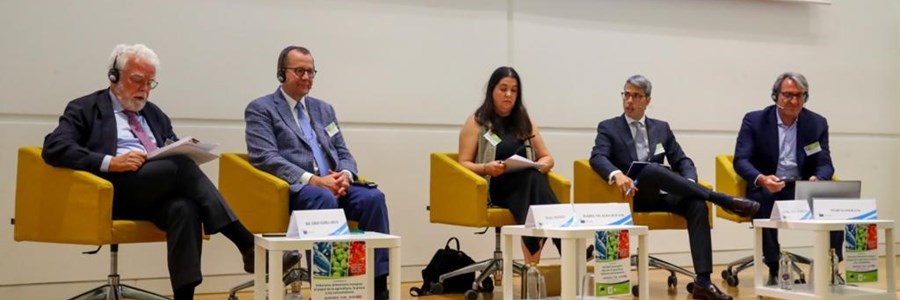Europêche calls for a Commissioner exclusively devoted to Fisheries

The European Economic and Social Committee (EESC) organized a conference yesterday on ‘EU food sovereignty: the role of agriculture, fisheries and consumers’. The event addressed the importance of food production in the EU, the role of the primary sector and of consumers in ensuring strategic autonomy. As part of the panel, Europêche regretted that despite the generalised improvement in the state of fish stocks, the EU’s self-sufficiency has been steadily declining in the last decade. Currently, the EU only produces 30% of the fish it consumes. As a consequence, Europêche called for a structural shift within the European Commission, specifically proposing the establishment of a dedicated Fisheries Commissioner for the term 2024-2029, separate from environmental affairs, with a strong focus on ensuring food security.
According to the European Market Observatory for Fishery and Aquaculture Products (EUMOFA)[1], “the EU’s self-sufficiency has been following a negative trend since 2018, which reflects both the downward trend of EU production and, even more, the increase of imports. The highest level of self-sufficiency – 46% – was reached in 2014.” From 2014 onwards, which coincided with the entry into force of the Common Fisheries Policy adopted in 2013, the EU is shifting away from its self-sufficiency goal.
Mr Voces, managing director of Europêche, argued that “fishers have suffered tremendous socio-economic losses over the last decade due to hefty quota cuts with the promise that, once recovered, seafood production would multiply. The EU has moved from 5 stocks at sustainable levels (MSY[2]) in 2009 to 60 in 2022 and yet seafood production has decreased.” “Thus, the CFP is not delivering its objective to reduce seafood dependence”, he underlined.
Mr Voces regretted that, instead of trying to revert the situation, the EU is prioritising marine renewable energy and environmental protection over food security. While energy transition is important, it should never undermine healthy and sustainable food production. Likewise, the sector observes with concern how environmental policies are taking over fisheries management, which breaks the balance of the three pillars of sustainability (people, planet and profit). This has translated into more area closures and restrictions which, combined with external factors such as Brexit, high-energy prices and inflation, are decimating the fleet and food security.
Mr Voces concluded: “Perhaps the fact that fisheries and environmental policies have been placed under the mandate of the same Commissioner has not helped. Fisheries, as an exclusive competence of the EU, merits its own political leader. For the upcoming European Commission mandate (2024-2029), we firmly advocate for fisheries to be exclusively placed under the mandate of a dedicated Commissioner for Fisheries and Maritime Affairs. The EU needs to return to a model where primary food production and self-sufficiency are true core principles. If anything, fisheries should be considered in conjunction with agriculture rather than environment, as both the Council of the EU (AGRIFISH) and the Treaty of the EU collectively address them together."
ENDS
Press contacts:
Rosalie Tukker, Senior Policy Officer of Europêche: +32 2230 48 48 rosalie.tukker@europeche.org
[1] The EU Fish Market – 2022 Edition https://www.eumofa.eu/market-analysis
[2] Maximum Sutainable Yield
Attachments:
Tags: food security, self-sufficiency, sustainable and responsible fisheries, dg mare, Commission, Commissioner